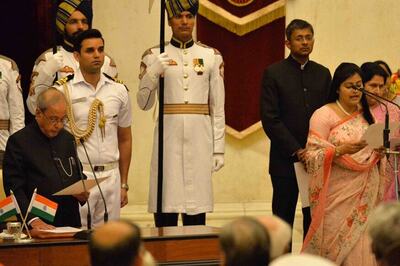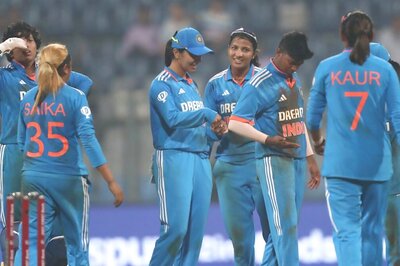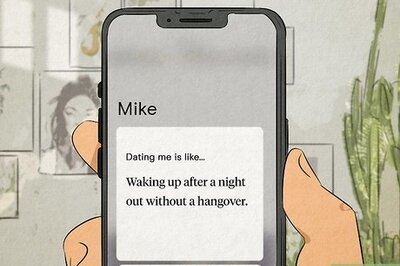
views
In response to the barbaric murder of an Udaipur tailor, Kanhaiya Lal, by two Muslim men, Hazrat Maulana Khalid Saifullah Rahmani, general secretary of the All India Muslim Personal Law Board (AIMPLB), gave an interesting statement. On the face of it, he criticised the killing, calling it a “brutal attack on a poor man” by “some non-ethical minds”. But when one looks at the finer points of the statement, it becomes obvious that this was a conditional criticism.
Rahmani said, “It is a grave crime to defame and slander any religious personality. The derogatory words spoken by (former) BJP spokesperson Nupur Sharma against Prophet Mohammed are very painful for the Muslim community. The inaction of the government against this crime is nothing but rubbing salts on our wounds.”
The statement is problematic as it condemns the killing but in the same breath attempts to justify it. In fact, the biggest culprit, as per Rahmani, is the Government of India which failed to act against Nupur Sharma, whose “derogatory words” have “pained” the Muslim community. So, in the larger scheme of things, these two Muslim men were provoked to act in a gruesome manner by the statement of Nupur Sharma and the failure of the BJP government to act against her!
What Rahmani conveyed indirectly, Congress leader Pawan Khera said it bluntly. He wrote on Twitter, “Kanhaiya Kumar, Akhlaq and Pehlu Khan — all became victims of hatred. Who is creating an atmosphere of fanaticism in the country? Who is creating controversies in society? Who is gaining political mileage by spreading hatred? Everyone knows who he is. Everyone is watching, but he is silent.”
It is this mindset that invariably makes people look for the “root cause” of any dastardly incident; they invent one when there is none. This mindset stops the society as a whole from introspecting where the problem actually lies. In this narrative, a make-believe victimhood is invented, while the real victims are left to lick their own wounds.
According to Wikipedia, blasphemy in Islam is an impious statement or action involving Allah that finds a much wider gaze in the vernacular, encompassing not just ridiculing or vilifying of Islamic qualities but also disputing any of the religion’s essential doctrines. In nations like Pakistan, Saudi Arabia, and Indonesia, blasphemy cases are becoming rampant as a tactic for persecuting minorities. According to the Centre for Social Justice, at least 1,500 individuals were accused of blasphemy, and at least 75 people accused of blasphemy were murdered in Pakistan. According to a study conducted by a US government advisory body, Pakistan used blasphemy laws more than any other country on the planet.
In recent years, many people have been lynched after being accused of blasphemy. Pakistan’s anti-defamation laws, which carry the death penalty, are reported to be often utilised to settle personal scores in the Muslim-majority nation, according to rights groups. The bulk of the 71 nations that have made blasphemy illegal are Muslim-dominated countries. Penalties vary in severity, as does the degree to which these laws are implemented. Blasphemy is punished by death in Iran, Pakistan, Afghanistan, Brunei, Mauritania, and Saudi Arabia. With a possible punishment of three years in jail, Italy has the worst blasphemy laws among non-Muslim-majority nations. Apostasy is illegal in half of the world’s 49 Muslim-majority countries. This means that leaving Islam could get you in trouble with the law.
In addition to the high-profile cases such as the one involving The Satanic Verses in 1988 and the Charlie Hebdo massacre in 2015, there have been a few other cases like the 2019 Kamlesh Tiwari case, wherein the victim was shot and stabbed for ‘blasphemous’ statements; or, the Kishan Bharwad case, which saw a 27-year-old man from Ahmedabad being shot death for an alleged ‘blasphemous’ social media post, which apparently was a repost.
The murder of Kanhaiya Lal does not come as a surprise to those who have a basic understanding of Islam. For, there are interpretations of the holy book, which are especially taught in religious seminaries and madrassas, that find themselves to be antithesis of modern, liberal sensibilities. There are verses that divide humanity into believers and non-believers, with the latter having no chance of redemption, however good he might be.
Societies that fail to discuss and adapt with the passage of time are destined to perish. Sanatan Hindu Dharma is thousands of years old; hundreds of sages sacrificed their lives to advance it. They also allowed detractors to discuss and debate the shifting values of life as time passed.
Islam, on the other hand, is believed to be a perfect and perfected religion. This leaves hardly any scope for debate, discussion and dissent. It is this mindset that stops any reform. For, how can a perfect religion be reformed? And if it is reformed, how can it be a perfect religion? When a fake news is spread about someone ridiculing the Prophet, then this mindset ensures there are people readily available to go to any extreme length to “avenge” the so-called mocking.
The two men who killed Kanhaiya Lal, therefore, don’t think they have done anything wrong. Their video makes it abundantly clear that they are only adhering to the religious texts. In this backdrop, it is necessary to put a full-stop to the radicalistion of Islamic institutions, the incitement of Muslims to riot on the streets, and the dissemination of religious texts that incite violence. The government must take this issue seriously and organise a conference with Muslim ulema and encourage them to push liberal values.
Muslim clerics must be encouraged to issue fatwa against blasphemy, which is at the root of the problem. The administration must make it clear that the idea of blasphemy has no place in a democracy like India. Also, it’s time we looked at the problem without being apologetic or without trying to do a balancing act. Such politically correct statements may sound nice but in the long term it only helps strengthen Islamist forces in the country.
Gopal Goswami is a research scholar, NIT Surat. Yuvraj Pokharna is an independent journalist and columnist. The views expressed in this article are those of the authors and do not represent the stand of this publication.
Read all the Latest News , Breaking News , watch Top Videos and Live TV here.




















Comments
0 comment